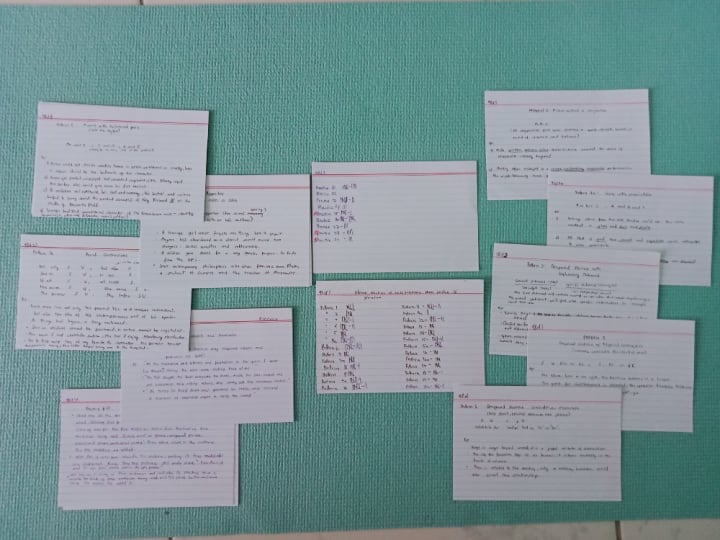Unleash Your Potential: 4 Mental Models to Master a Skill
Powerful strategies to progress faster and persist beyond fear

Learning a difficult skill is a roller coaster ride. Sometimes you’re full of hope and positivity. Other times, full of fear.
If you’re not careful enough, you’ll quit before you reach the finish line. Or worse, you’ll quit before you even get started.
So how can you overcome resistance — self-doubt, confusion, uncertainty?
Here are four powerful mental models to progress faster and persist beyond fear when you learn a new skill.
1. Master the basics
If you want to learn and master a skill, dig deep for its core elements, and master each element so you can build rock-solid habits.
In the early days of his blogging career, James Clear broke down each aspect of writing an article into its core elements — writing headlines and introductions, adding transitions, storytelling, and more. He collected models for each element and compiled them into a spreadsheet.
“Then I set about testing and refining my ability,” James writes, “to perform each small aspect of the larger task.”
He became so good at his craft that, in 2018, his blog monthly readers rose to 1 million. Yes, you heard it right. One. Million. Monthly. Readers.
James built a successful brand by writing articles. And that brand turbo-charged the success of the book he launched in 2018, the Atomic Habits. As of today, the book sold over three million copies worldwide.
And one secret to his success was his relentless pursuit to master the basics of writing.
Deep practice of the basics, core elements, fundamentals — or whatever you call it — helps to build true mastery, not just in writing but in everything.
How I used mastering the basics in school
I used this principle when I was a Mechanical engineering student.
In my third year, I topped three of the six exams (with 250+ examinees) on Statics of Rigid Bodies — an advanced Physics that requires mastery of Calculus, Trigonometry, Geometry, and Algebra. It is, arguably, the most feared subject in our university as more than half of all engineering students fail every year.
While most of my colleagues approached the complex problems — even without having a firm grasp of the fundamentals — head-on, I chose to focus on fundamentals.
I broke down complex concepts into chunks, and I mastered each chunk, one by one.
To give some context, I graduated in high school with the lowest final grade in Physics, out of all 45 students in our class. My final grade was 81; the passing grade was 75. In other words, I used to suck in the subject.
Did I suddenly get smarter, more intelligent in college?
No. I just mastered the simpler concepts. If all those examinees prepared for those exams the way I did, if they also mastered the basics, many would’ve scored higher than I did.
So it’s safe to say that talent can be beaten by consistent effort plus better technique. The good thing is you are capable to cultivate both.
How to Master the Basics
- Consider a skill you want to learn. Maybe you want to learn how to write articles or play a musical instrument or start a new sport or career.
- Ask yourself, “What are the core elements of this complex skill?” List them down.
- Then pick one from your list, and spend at least 5 — 30 minutes every day, depending on the complexity of the basic skill, and practice it to perfection.
Also, remember to alternate deep practice and performing the skill as a whole. So you can slowly integrate the right habits into your system and build strong muscle memory.
So please don’t view mindful practice of fundamentals as a chore. Instead, view it as your lethal weapon.
“I fear not the man who has practiced ten thousand kicks once, but I fear the man who has practiced one kick ten thousand times.”
- Bruce Lee
2. Use 80/20 Principle
In his book, The 80/20 Principle, Richard Koch writes, “a minority of causes, inputs or effort usually lead to a majority of the results, outputs or rewards.”
- 20% of the time you spend on your job creates 80% of what you accomplish
- 20% of your clothes you wear 80% of the time
- 20% of products creates 80% of the sales
- 20% of customers brings 80% of a business’ profit
- 20% of criminals account for 80% of the crime
It simply means not all things create equal results. Some are more valuable and more impactful than others.
How I use the 80/20 Principle to learn how to write
In 2017 I started wanting to be a writer.
But I have a problem: I’m not a native English speaker, and I couldn’t write well. When I was a student, I hated writing essays because I couldn’t express my thoughts well in sentences.
So I created my list of basic elements of writing. And, among my list, I chose to focus on:
1. Getting comfortable pouring words on the page.
I practice freewriting — pouring words on the page without regard for grammar, punctuation, and spelling — for at least ten minutes a day.
2. Learning how to write a sentence.
I study how to write sentences for fifteen minutes every night, on my bed, before I sleep.
Sometimes I spend my allotted time collecting good sentences, sometimes I choose one from my collection and study its structure, sometimes I read about parts of speech.

Last year I couldn’t even write a decent paragraph. Now, I can better spot awkward phrases and confusing sentences from my draft.
If not for applying the 80/20 principle, if not for focusing on the essential core elements (essential in my case) I would not have cultivated the courage to allow myself to write badly and to nurture my ability to transform my bad sentences into something better.
And, most importantly, I would not have cultivated the courage to show my work.
What about the rest of the items on my list? Flow, rhythm, readability, metaphor, storytelling, and more — I can worry about these later on. After all, learning how to write sentences somehow improves some of them.
Focus on the vital few
If you have listed ten basic elements of a skill, two or three items from your list can create more improvements in your craft than all other items combined.
So, your goal now is to distinguish the vital few from the trivial many that will jumpstart your progress. Then focus your energy on those vital few.
Trying to be good at everything at once creates a millimeter of progress in a million directions. What you want is a meter of progress in a single direction, the direction of your desired destination.
“By investing in fewer things, we have the satisfying experience of making significant progress in the things that matter most.”
- Greg Mckeown
3. Imitate Your Models
After you’ve listed the basic elements of a skill you want to learn, after you’ve determined the most impactful ones from your list, your next goal is to practice each basic element to perfection — to build the right habits.
How will you do that? How will you build the right habits?
Lee Kuan Yew once said, “Find out what works. Then do it.”
And there’s no better way to learn what works than from the top performers you admire.
The late Kobe Bryant, one of the greatest NBA players of all time, honed his skills by imitating and copying from the many people he admires.
One player who Kobe admits stealing moves from — and probably the most obvious — is Michael Jordan. After he saw a game-winning shot by Demar Derozan, Kobe told the Bleacher Report Magazine this:
“It was a carbon copy of my stop-pivot-turn-fade, which I learned from Michael. Damn nearly 100% of the technique. Damn near 100%.”
Michael Lewis, a New York Times bestselling author, first learned how to write by imitating his hero. In a podcast with Tim Ferriss, Michael said, “When I was first starting to write, I sounded like Tom Wolfe.”
The greats — in arts, sports, and music — didn’t learn and master their skills in a vacuum. They have learned from their models, consciously or unconsciously or both.
But isn’t copying unethical?
No, because we are not capable of perfectly copying anyone. Our influences, our idiosyncrasies, our unique experiences, and our environment always add up to our way of doing things.
It means we intuitively add our personal touch even if we try to perfectly copy. Our failure to copy our heroes is what will make us unique.
“Start copying what you love. Copy copy copy copy. At the end of the copy, you will find yourself.”
- Yohji Yamamoto
Do not just copy from one of your heroes. Copy from all of them. Copy the moves you like, combine them all, make them yours.
As Gary Panter once wrote, “If you have one person you’re influenced by, everyone will say you’re the next whoever. But if you rip off a hundred people, everyone will say you’re so original.”
4. Think 1%
Whenever we learn a new skill or complete a challenging project, there will be moments of self-doubt, moments of feeling we’re not getting somewhere, of feeling we’re getting lost.
There will be moments of negative self-talk, “Why did I start to do this?” “I am not good enough.” “I should quit.”
This is because the progress we make in the early stages of our learning journey seems insignificant if we look at the bigger picture. The destination seems so far away. And the feeling of not making progress makes us doubt our chances of getting ‘there’.
According to Carol Dweck’s book, Mindset, if we don’t believe we can win, we lose motivation to keep going.
So what can we do?
One of the best things we can do is to think 1%.
If you just aim to make at least 1% progress, you can narrow down your vision at the task at hand. And not on the many things that need to be done in the next days or weeks or months.
This helps you to stop clinging to tomorrow’s tasks — on what you have no control — so you can focus all your energy and attention on what you can do at the moment to influence the result.
“You cannot control the result,” James Clear writes, “But you can influence it.”
So when you feel like you’re not making progress, ask yourself:
- “Will this practice session result in at least 1% progress?”
- “Will showing up now to practice move me closer to my goal?”
The answer will always be yes.
Every time you show up and do something small, you’re casting a vote for the kind of person you want to become.
So just show up. Just make at least 1% progress every day. And you’ll eventually get ‘there’.
San Antonio Spurs has this quote in their locker room:
“When nothing seems to help, I go and look at a stonecutter hammering away at his rock, perhaps a hundred times without as much as a crack showing in it. Yet at the hundred and first blow, it will split in two, and I know it was not that last blow that did it — but all that had gone before.”
- Jacob Riis
Final Thoughts
Learning a difficult skill takes time.
There will be times when you will doubt yourself and succumb to self-pity. We’ve all been there. But remember, the harder the skill is to learn, the more fulfilling it is when you reach the finish line.
Ryan Holiday (author of The Obstacle is The Way) said, “The wall you hit is what keeps other people away.”
Indeed, it’s the difficulty of acquiring a skill that determine its value. If it’s easy, more people will attempt to learn it. It’s the law of demand and supply.
So embrace difficulty. Accept that when you learn something new, you will look and sound like a fool.
As what Jordan Peterson said, “You must be willing to be a fool to advance.”
P.S.
Resources:
- Ultralearning by Scott Young
- The Little Book of Talent by Daniel Coyle
- 5 Elements of Effective Thinking by Edward Burger and Michael Starbird
- Atomic Habits by James Clear
- The 80/20 Principle by Richard Koch
- Steal Like an Artist by Austin Kleon
- Essentialism by Greg McKeown
About the Creator
Mark Joseph Aduana
Loves learning about creativity, learning strategies, and effective thinking.






Comments
There are no comments for this story
Be the first to respond and start the conversation.